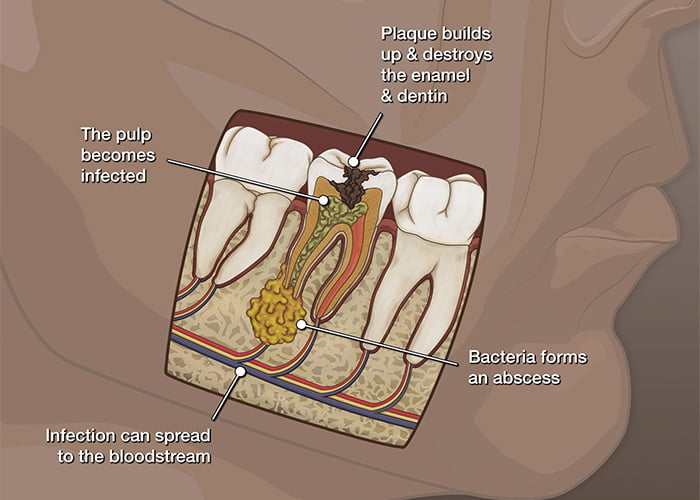By being able to recognize these signs of infection after root canal, patients can prevent the infection from spreading further or causing complications.
What are root canal infections?
A root canal infection is a dental condition that occurs when bacteria invade the soft tissue inside a tooth known as the pulp. The pulp contains blood vessels, nerves, and connective tissues that help the tooth grow during development.
When the pulp becomes infected or inflamed, it can cause severe pain and discomfort and may lead to the development of an abscess, a pocket of pus that forms around the tooth. A root canal procedure is typically necessary to treat a root canal infection.
During this procedure, the dentist or endodontist removes the infected pulp from the tooth and fills the space with a rubber-like material called gutta-percha. A dental crown may also be placed over the tooth to protect it from further damage. This article highlights the importance of being able to identify the signs of an infection after undergoing root canal treatment, to help prevent complications.
What causes root canal infections?
Root canal infections can occur due to a variety of reasons. There are many reasons why a tooth can have an infection after a root canal. These include:
- Complex root canal anatomy: The shape of your root canals can be very complicated and areas of infection may go undetected in the first procedure.
- Incomplete cleaning and disinfection: Your tooth could have narrow or curved canals that weren’t fully cleaned and disinfected during the root canal.
- Accessory canals: Your tooth may also have extra, accessory canals that could be housing bacteria which may reinfect a tooth.
- Delayed placement of restoration: If the placement of the crown or permanent restoration is delayed following treatment, it could allow harmful bacteria back into your tooth.
- New cavity or damage: Your tooth may get a new cavity after treatment, or become cracked or damaged, leading to a new root canal infection.
See more: How Much Does a Root Canal Cost?
It’s important to address these issues promptly to avoid the need for additional root canal procedures or even tooth extraction.

Signs You May Have An Infection After A Root Canal
Some of the signs that you may have an infection after a root canal procedure include persistent or reoccurring pimples on the gums, persistent feeling of lethargy, the area of the tooth and gums feeling hot, and fever, constant pain. If you experience any of these symptoms, it’s essential to contact your dentist or endodontist right away.
Persistent or Reoccurring Pimples on the Gums
If you notice a pimple or bump on your gums that persists or continues to reappear, it may be a sign of an infection. This can occur when pus from the infected area is trying to drain out.
Persistent Feelings of Lethargy
An infection can cause you to feel tired or run down, even if you haven’t been exerting yourself. This is because your body is using energy to fight off the infection.
The area around the Tooth and Gums Feels Hot
In some cases, you may notice that the area around the affected tooth and gums feels warm or hot to the touch. This can be a sign that the infection is spreading and causing inflammation.
Fever
Fever after root canal can indicate that an infection has spread beyond the affected tooth and gums and into other parts of your body. A fever is usually defined as a temperature of 100.4°F (38°C) or higher.
Persistent Pain
If you continue to experience pain or discomfort in the affected area, even after the root canal procedure, it may be a sign that the infection has not been fully treated. This can be a sign that the infection is spreading and causing inflammation in the surrounding tissues.
Can an infection spread to the gums or to other teeth?
An infection after a root canal can spread to the gums and other teeth. When an infection is not properly treated, bacteria can spread to the surrounding gums and tissues, causing inflammation and infection. This can lead to symptoms such as redness, swelling, and tenderness in the gums. In severe cases, the infection can even spread to other teeth, causing new infections.
Additionally, an untreated infection can also spread to other parts of the body, including the jawbone, sinuses, and bloodstream. This can cause serious health complications, such as abscesses, bone loss, and even sepsis. Therefore, it’s important to seek prompt treatment for any signs of infection after a root canal.
Read more: How Much Do Snap-on Dentures Cost ?
How are root canal infections treated?
When it comes to root canal infection treatment, a root canal retreatment may be recommended by a dentist or endodontist to give the affected tooth a second chance. This procedure is similar to the first root canal therapy and involves several steps to effectively remove the infection.
The dentist or root canal specialist will examine the tooth and surrounding area using X-rays to locate any infected or necrotic tissue. A protective barrier will be placed around the tooth to protect the gums and mouth. The dentist will use a dental drill to access the pulp and root canal area and clean out the infected or dead tissue.
After cleaning the area, the dentist will dry it out and fill it with a safe, latex-based polymer filler called gutta-percha. To protect the tooth and allow it to heal from infection, filling material such as amalgam or composite will be used to seal the tooth. A permanent crown may be necessary to protect the tooth from future infections.
Overall, root canal retreatment effectively treats a root canal infection and saves the affected tooth. Your dentist or endodontist can discuss the best treatment options for your situation.
Make Your Appointment With Dentist For Life Today!
Making an appointment with a trusted and experienced dentist is important for maintaining good oral health, preventing and treating an infection after a root canal, and addressing any concerns you may have about your teeth and gums. At a dentist in Marysville Ohio, we are committed to providing high-quality dental care to our patients.
Our team of skilled dentists and staff use the latest technology and techniques to ensure your comfort and satisfaction. Contact Dentist for Life today to schedule an appointment and start your journey to a healthier, happier smile.



